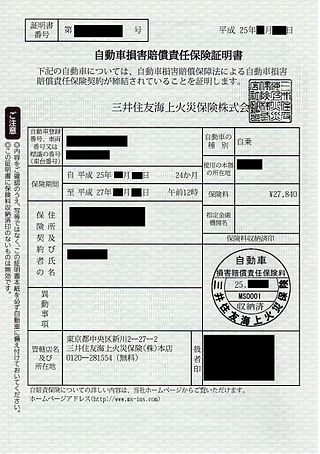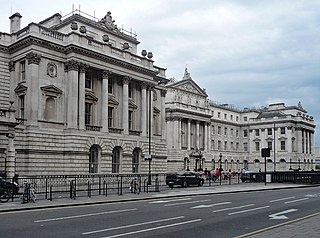Related Research Articles
A fuel tax is an excise tax imposed on the sale of fuel. In most countries the fuel tax is imposed on fuels which are intended for transportation. Fuel tax receipts are often dedicated or hypothecated to transportation projects, in which case the fuel tax can be considered a user fee. In other countries, the fuel tax is a source of general revenue. Sometimes, a fuel tax is used as an ecotax, to promote ecological sustainability. Fuel taxes are often considered by government agencies such as the Internal Revenue Service as regressive taxes.

Vehicle insurance is insurance for cars, trucks, motorcycles, and other road vehicles. Its primary use is to provide financial protection against physical damage or bodily injury resulting from traffic collisions and against liability that could also arise from incidents in a vehicle. Vehicle insurance may additionally offer financial protection against theft of the vehicle, and against damage to the vehicle sustained from events other than traffic collisions, such as keying, weather or natural disasters, and damage sustained by colliding with stationary objects. The specific terms of vehicle insurance vary with legal regulations in each region.
Excise tax in the United States is an indirect tax on listed items. Excise taxes can be and are made by federal, state, and local governments and are not uniform throughout the United States. Certain goods, such as gasoline, diesel fuel, alcohol, and tobacco products, are taxed by multiple governments simultaneously. Some excise taxes are collected from the producer or retailer and not paid directly by the consumer, and as such, often remain "hidden" in the price of a product or service rather than being listed separately.
Vehicle Excise Duty is an annual tax levied as an excise duty, and which must be paid for most types of powered vehicles which are to be used or parked on public roads in the United Kingdom. Registered vehicles that are not being used or parked on public roads and which have been taxed since 31 January 1998 must be covered by a Statutory Off Road Notification (SORN) to avoid VED. In 2016, VED generated approximately £6 billion for the Exchequer.

A Finance Act is the headline fiscal (budgetary) legislation enacted by the UK Parliament, containing multiple provisions as to taxes, duties, exemptions and reliefs at least once per year, and in particular setting out the principal tax rates for each fiscal year.
Road tax, known by various names around the world, is a tax which has to be paid on, or included with, a motorised vehicle to use it on a public road.
The constitutional basis of taxation in Australia is predominantly found in sections 51(ii), 90, 53, 55, and 96, of the Constitution of Australia. Their interpretation by the High Court of Australia has been integral to the functioning and evolution of federalism in Australia.
A vehicle licence is issued by a motor registration authority in a jurisdiction in respect of a particular motor vehicle. A current licence is required for a motor vehicle to be legally permitted to be used or kept on a public road in the jurisdiction. Usually a licence is valid for one year and an annual licence fee is payable before a new one is issued.
The history of the English fiscal system affords the best known example of continuous financial development in terms of both institutions and methods. Although periods of great upheaval occurred from the time of the Norman Conquest to the beginning of the 20th century, the line of connection is almost entirely unbroken. Perhaps, the most revolutionary changes occurred in the 17th century as a result of the Civil War and, later, the Glorious Revolution of 1688; though even then there was no real breach of continuity.
The Vehicle register in the United Kingdom is a database of motor vehicles. It is a legal requirement in the UK for most types of motor vehicle to be registered if they are to be used on the public road.

R v Barger is a 1908 High Court of Australia case where the majority held that the taxation power could not be used by the Australian Parliament to indirectly regulate the working conditions of workers. In this case, an excise tariff was imposed on manufacturers, with an exemption being available for those who paid "fair and reasonable" wages to their employees.

Motoring taxation in the United Kingdom consists primarily of vehicle excise duty, which is levied on vehicles registered in the UK, and hydrocarbon oil duty, which is levied on the fuel used by motor vehicles. VED and fuel tax raised approximately £32 billion in 2009, a further £4 billion was raised from the value added tax on fuel purchases. Motoring-related taxes for fiscal year 2011/12, including fuel duties and VED, are estimated to amount to more than £38 billion, representing almost 7% of total UK taxation.

The Regional Transport Office or District Transport Office or Regional Transport Authority (RTO/DTO/RTA) is an office administered by the State Governments constituted under Section 213 (1) of the Motor Vehicles Act, 1988 of India and is responsible for implementing the various provisions of this Act. It operates under the Transport Department of the State Government. It is responsible for maintaining a database of drivers and a database of vehicles for various states of India.

His or Her Majesty's Excise refers to 'inland' duties levied on articles at the time of their manufacture. Excise duty was first raised in England in 1643. Like HM Customs, the Excise was administered by a Board of Commissioners who were accountable to the Lords Commissioners of the Treasury. While 'HM Revenue of Excise' was a phrase used in early legislation to refer to this form of duty, the body tasked with its collection and general administration was usually known as the Excise Office.

An excise, or excise tax, is any duty on manufactured goods that is normally levied at the moment of manufacture for internal consumption rather than at sale. Excises are often associated with customs duties, which are levied on pre-existing goods when they cross a designated border in a specific direction; customs are levied on goods that become taxable items at the border, while excise is levied on goods that came into existence inland.
The Salter Report was named after Arthur Salter, who chaired an influential conference of road and rail experts in 1932 which reported in 1933. The report directed British government policy for transport funding for decades to follow.
The hypothecation of a tax is the dedication of the revenue from a specific tax for a particular expenditure purpose. This approach differs from the classical method according to which all government spending is done from a consolidated fund.
William Rees Jeffreys was a British cyclist and early campaigner for road improvements who became a key figure in the early 20th-century development of the UK highway system. As honorary secretary and later chairman of the Roads Improvement Association and the first secretary of the Road Board, he was an early advocate of a ring road around London, and helped instigate the British road numbering system. In 1937 Jeffreys was described by former UK Prime Minister David Lloyd George as "the greatest authority on roads in the United Kingdom and one of the greatest in the whole world."
The Roads Improvement Association, established in 1882, was a British organisation which campaigned for better roads in the late 19th century and first half of the 20th century. Founded by cycling organisations ten years before the first motor cars arrived on the roads, it became predominantly a motoring body before World War I.
References
- ↑ Daunton, Martin J (2002). Just Taxes: The Politics of Taxation in Britain, 1914–1979. England: Cambridge University Press. ISBN 0-521-81400-6.
- ↑ "Motor Car Legislation". House of Lords Hansard. 178 (489–490). 16 July 1907.
I venture to think that motoring is becoming less unpopular every day, and if we could only get rid of the dust nuisance a great deal of the unpopularity still remaining would be removed … With regard to the use of the roads by motorcars, I should like to see adopted the suggestion which was made by a friend of mine in the other House, who advocated a tariff on motor-cars of £1 or 10s. per horse-power. The owners would not feel the extra expense; and the very large sum which would be derived from the tariff should be placed at the disposal of some Government Department to be distributed for the maintenance of roads, so that dust would not accumulate, or for the compensation of those who suffered inconvenience from motor-cars..
- 1 2 Louise Butcher (25 November 2008). "Vehicle excise duty (VED)". House of Commons Library.
- ↑ House of Commons Environmental Audit Committee (22 July 2008). "Vehicle Excise Duty as an environmental tax" (PDF). The Stationery Office Limited.
- 1 2 Plowden, William (1971). The Motor Car And Politics 1896–1970. London: The Bodley Head. p. 201. ISBN 0-370-00393-4.
- ↑ "Orders of the Day: Ministry of Transport". House of Commons Hansard. 267: 822–823. 20 June 1932.
- ↑ Sir J. Stamp (31 January 1933). "Road And Rail - A Defence Of The Salter Report". The Times.
- ↑ OPSI (UK legislation database)